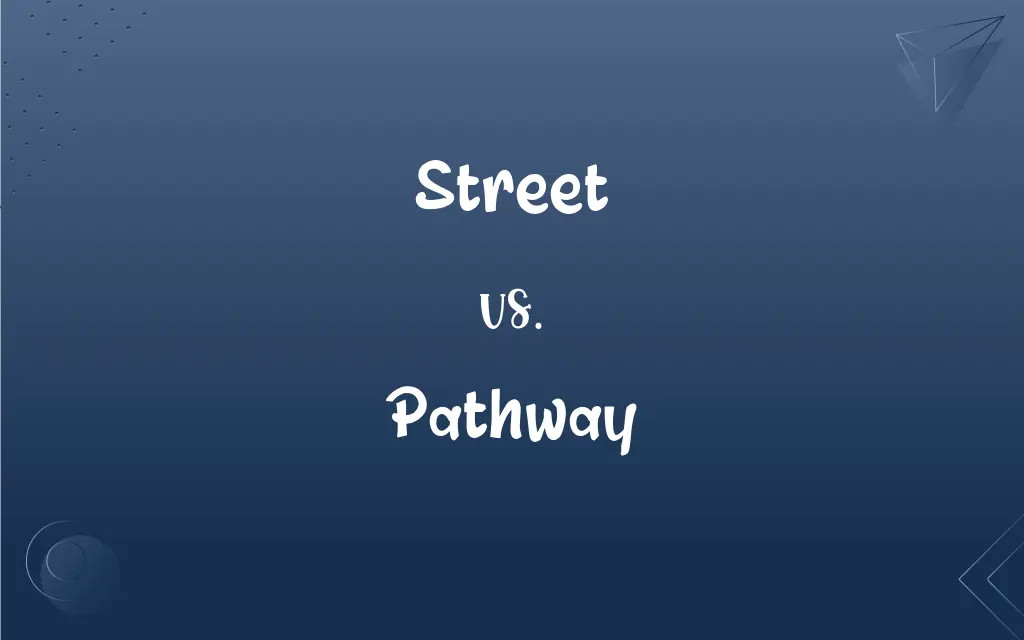Street vs. Pathway: What's the Difference?
Edited by Aimie Carlson || By Janet White || Updated on October 7, 2023
A "Street" is a paved public road in a city or town, while a "Pathway" is a pedestrian walkway, often unpaved, that may exist in various environments, including natural settings.

Key Differences
The terms "Street" and "Pathway" depict different types of passages used for commuting. A "Street" is typically an urban or suburban thoroughfare that is paved and is part of a city or town's infrastructure. It’s designed to facilitate vehicular and pedestrian traffic and is flanked by buildings, houses, or other structures. In contrast, a "Pathway" is generally a narrower route, often not suited for vehicular traffic, designed primarily for pedestrians and sometimes cyclists. It may be found in urban, suburban, or natural settings, often serving as a shortcut or recreational route.
"Street" implies a certain level of formality and urban development. It is usually lined with buildings, such as houses, shops, or offices, and is integrated into a larger network of roads, complete with traffic signals and signs. It serves as a conduit for vehicular traffic, in addition to providing access to residences and businesses. On the other hand, a "Pathway" implies a more informal and sometimes scenic route, often unpaved, and can be found in parks, forests, or alongside bodies of water. It is often used for walking, jogging, or cycling and is not typically designed to accommodate cars or other vehicles.
Another distinguishing aspect of "Street" and "Pathway" is their dimensions and surface. Streets are wider, allowing for the simultaneous passage of multiple vehicles, and are surfaced with materials like asphalt or concrete to withstand vehicular traffic. Pathways are usually narrower, meant for the passage of individuals or small groups, and may have a variety of surfaces, including dirt, gravel, or pavement, reflecting their more varied locations and uses.
In terms of maintenance and construction, streets are managed by municipal bodies and are integral to a city or town's planning and development. They require regular maintenance, including repairs and cleaning, and are subject to various regulations and laws. Pathways, on the other hand, may be managed by a variety of entities, including municipalities, park services, or private owners, and their maintenance and construction can vary widely, depending on their location and use.
In summation, while "Street" and "Pathway" are both passageways, they are markedly different in their design, use, location, and management, with streets being formal, paved routes in urban or suburban settings, and pathways being informal, often unpaved routes for pedestrians, located in a variety of environments.
ADVERTISEMENT
Comparison Chart
Usage
For vehicular and pedestrian traffic.
Primarily for pedestrian traffic.
Location
Usually in urban or suburban areas.
Can be in various environments.
Surface
Paved with asphalt or concrete.
Can be paved or unpaved.
Width
Wide enough for multiple vehicles.
Narrower, suited for individuals or small groups.
Management
Managed by municipal bodies.
Managed by various entities.
ADVERTISEMENT
Street and Pathway Definitions
Street
A public road in a city or town.
The children played in the street after school.
Pathway
A route to or way of access to; way of reaching or achieving something.
This degree opens up a new pathway to success.
Street
A particular area in a city known for a specific type of activity or business.
The financial district is known as Wall Street.
Pathway
A pedestrian route or track.
We followed the pathway through the woods.
Street
Abbr. St. A public way or thoroughfare in a city or town, usually with a sidewalk or sidewalks.
Pathway
A course of action or a sequence of events.
The course offered a pathway to employment.
Street
Such a public way considered apart from the sidewalks
Don't play in the street.
Pathway
A way of achieving a specified result; a course of action.
Education is a pathway to success.
Street
A public way or road along with the houses or buildings abutting it
Lives on a quiet street.
Pathway
A path.
Street
The people living, working, or habitually gathering in or along a street
The whole street protested the new parking regulations.
Pathway
A course usually followed by a body part or process.
Street
Street A district, such as Wall Street in New York City, that is identified with a specific profession. Often used with the.
Pathway
A chain of nerve fibers along which impulses normally travel.
Street
The streets of a city viewed as the scene of crime, poverty, or dereliction.
Pathway
A sequence of enzymatic or other reactions by which one biological material is converted to another.
Street
The common public viewed as a repository of public attitudes and understanding.
Pathway
A footpath or other path or track.
Street
Near or giving passage to a street
A street door.
Pathway
(biochemistry) A sequence of biochemical compounds, and the reactions linking them, that describe a process in metabolism or catabolism.
Street
Taking place in the street
A street brawl.
Street crime.
Pathway
(figurative) A course of action.
Street
Living or making a living on the streets
Street people.
A street vendor.
Pathway
A footpath; a beaten track; any path or course. Also used figuratively.
In the way of righteousness is life; and in the pathway thereof is no death.
We tread the pathway arm in arm.
Street
Performing on the street
Street musicians.
A street juggler.
Pathway
A bundle of mylenated nerve fibers following a path through the brain
Street
Crude; vulgar
Street language.
Street humor.
Pathway
A trodden path
Street
Appropriate for wear or use in public
Street clothes.
Pathway
A strip of ground over which one walks.
A stone pathway led to the garden.
Street
A paved part of road, usually in a village or a town.
Walk down the street until you see a hotel on the right.
Street
A road as above, but including the sidewalks (pavements) and buildings.
I live on the street down from Joyce Avenue.
Street
The roads that run perpendicular to avenues in a grid layout.
Street
The people who live in such a road, as a neighborhood.
Street
The people who spend a great deal of time on the street in urban areas, especially, the young, the poor, the unemployed, and those engaged in illegal activities.
Street
An illicit or contraband source, especially of drugs.
I got some pot cheap on the street.
The seized drugs had a street value of $5 million.
Street
(finance) Wall Street.
Street
(attributive) Living in the streets.
A street cat; a street urchin
Street
Streetwise slang.
Street
(figuratively) A great distance.
He's streets ahead of his sister in all the subjects in school.
Street
(poker slang) Each of the three opportunities that players have to bet, after the flop, turn and river.
Street
A style of skateboarding featuring typically urban obstacles.
Street
(slang) Having street cred; conforming to modern urban trends.
Street
To build or equip with streets.
Street
To eject; to throw onto the streets.
Street
To heavily defeat.
Street
To go on sale.
Street
To proselytize in public.
Street
Originally, a paved way or road; a public highway; now commonly, a thoroughfare in a city or village, bordered by dwellings or business houses.
He removed [the body of] Amasa from the street unto the field.
At home or through the high street passing.
His deserted mansion in Duke Street.
Street
The roadway of a street{1}, as distinguished from the sidewalk; as, children playing in the street.
Street
The inhabitants of a particular street; as, the whole street knew about their impending divorce.
Street
A thoroughfare (usually including sidewalks) that is lined with buildings;
They walked the streets of the small town
He lives on Nassau Street
Street
The part of a thoroughfare between the sidewalks; the part of the thoroughfare on which vehicles travel;
Be careful crossing the street
Street
The streets of a city viewed as a depressed environment in which there is poverty and crime and prostitution and dereliction;
She tried to keep her children off the street
Street
A situation offering opportunities;
He worked both sides of the street
Cooperation is a two-way street
Street
People living or working on the same street;
The whole street protested the absence of street lights
Street
A thoroughfare with buildings or houses on either side.
We walked down the street looking at the shops.
Street
The urban environment or city life.
He learned the hard way of the street.
Street
The paved part of a public roadway.
The cat crossed the street swiftly.
FAQs
Can "pathway" be a career trajectory?
Yes, "pathway" can metaphorically refer to a career trajectory or professional course.
Is every street paved?
Most streets are paved, but there can be unpaved streets in less developed or rural areas.
Can "street" refer to a condition of urban life?
Yes, "street" can refer metaphorically to urban life or city conditions.
Are all streets public?
Most streets are public, but there can be private streets within gated communities or private properties.
Can "pathway" refer to a method or course of action?
Yes, "pathway" can metaphorically refer to a course of action or method to achieve something.
Can pathways be located in forests?
Yes, pathways are often located in forests or natural settings for walking or hiking.
Are streets usually wider than pathways?
Yes, streets are typically wider than pathways to accommodate vehicular traffic.
Can pathways be paved?
Yes, some pathways are paved, especially those in urban or park settings.
Is "street" synonymous with "road"?
While similar, a "street" is usually in an urban setting with buildings, while "road" is a general term for a route between two points.
Can a pathway be metaphorical?
Yes, "pathway" can be used metaphorically to describe ways through which one can achieve or experience something.
Can "pathway" refer to academic courses?
Yes, "pathway" can refer to a series of academic courses leading to a specific outcome or qualification.
Can streets be unnamed?
Typically, streets are named for navigational purposes, but in some cases, they may be unnamed.
Can a pathway be created by repeated use?
Yes, a pathway can form organically over time due to repeated foot traffic.
Do streets have traffic signs and signals?
Yes, streets usually have traffic signs and signals to manage vehicular and pedestrian traffic.
Are streets always straight?
No, streets can be straight, curved, or irregularly shaped.
About Author
Written by
Janet WhiteJanet White has been an esteemed writer and blogger for Difference Wiki. Holding a Master's degree in Science and Medical Journalism from the prestigious Boston University, she has consistently demonstrated her expertise and passion for her field. When she's not immersed in her work, Janet relishes her time exercising, delving into a good book, and cherishing moments with friends and family.
Edited by
Aimie CarlsonAimie Carlson, holding a master's degree in English literature, is a fervent English language enthusiast. She lends her writing talents to Difference Wiki, a prominent website that specializes in comparisons, offering readers insightful analyses that both captivate and inform.































































